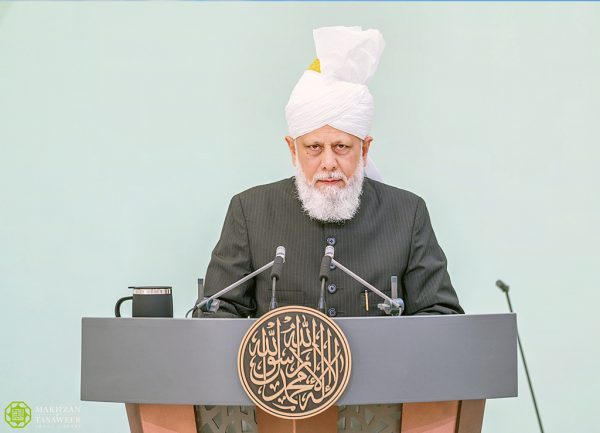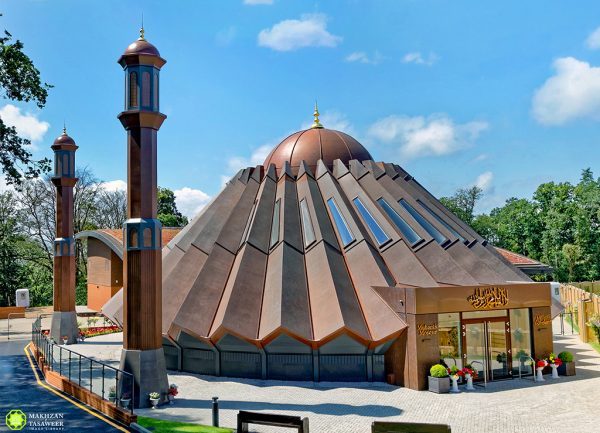After reciting Tashahhud, Ta‘awwuz and Surah al-Fatihah, His Holiness, Hazrat Mirza Masroor Ahmad (aba) said that he had been mentioning the slogans of idols raised by Abu Sufyan on the occasion of the Battle of Uhud, and the Holy Prophet’s (sa) response and instruction to raise slogans of God’s glory.

Response to Abu Sufyan’s Slogans During the Battle of Uhud
His Holiness (aba) quoted Hazrat Mirza Bashiruddin Mahmud Ahmad (ra) who detailed how Abu Sufyan glorified his idols when he thought that the Holy Prophet (sa) had been killed. In response, the Holy Prophet (sa) instructed his companions to declare the greatness of God, and say that Allah was their Protector whereas the disbelievers had no protector.
His Holiness (aba) further quoted Hazrat Mirza Bashiruddin Mahmud Ahmad (ra) who writes that when Abu Sufyan was declaring the false news that the Holy Prophet (sa) had been killed, the Holy Prophet (sa) instructed his companions to remain silent. He commanded the same when false news of the martyrdoms of Hazrat Abu Bakr (ra) and Hazrat Umar (ra) were being announced. But when Abu Sufyan started glorifying his idols, the Holy Prophet (sa) could not remain silent as the glory of God was being brought into question. And so, despite having remained silent before, now the Holy Prophet (sa) instructed the companions to proclaim that true glory belongs to God alone.
Martyrdoms of Hazrat Hanzalah (ra) and Hazrat Sa’d bin Rabi’ (ra).
His Holiness (aba) gave details regarding the martyrdoms of Hazrat Hanzalah (ra) and Hazrat Sa’d bin Rabi’ (ra). Hazrat Hanzalah (ra) was martyred in the Battle of Uhud after having gotten married just the day before the battle started. The Holy Prophet (sa) had seen angels washing his body on the battlefield. Hazrat Sa’d bin Rabi’ (ra) was also martyred in the Battle of Uhud. The Holy Prophet (sa) asked for someone to go and find out about Sa’d (ra) from the battlefield. A companion went looking for him and upon finding Sa’d (ra), the companion told him that the Holy Prophet (sa) was asking about him. Hazrat Sa’d (ra) asked for his greeting of ‘Salam’ to be conveyed to the Holy Prophet (sa). He asked for the Holy Prophet (sa) to be informed that he had endured 12 spear wounds, but that anyone who had come face to face with him in battle was killed. He said that his people should be told that if the Holy Prophet (sa) was martyred while they remained alive, then there would be no excuse for them. In other words, they should give up their lives to protect the Holy Prophet (sa) and Islam. This was the passion of Companions even in their dying breaths. After this, Hazrat Sa’d (ra) passed away and became a martyr. When the Holy Prophet (sa) heard this news, he prayed for Hazrat Sa’d’s (ra) mercy and said that he was a well-wisher of Allah and His Messenger (sa) both in his life and his death.
Barbaric Acts in Battle of the Disbelievers
His Holiness (aba) quoted Hazrat Mirza Bashir Ahmad (ra) who writes:
‘Now the Holy Prophet (sa) had also descended into the battlefield and the work of tending to the bodies of the martyrs was underway. At the time, the sight that was before the Muslims was one to bring forth tears of blood. Seventy Muslims were laying in the field of battle smothered in dust and blood, and they displayed a horrific scene of the barbaric Arab tradition known as Muthlah. Among the casualties, there were only six Muhajirin and the rest were all from the Ansar. The number of men slain from among the Quraish was twenty-three. When the Holy Prophet (sa) came to the body of his paternal uncle and foster brother, Hamzah bin ‘Abdil-Muttalib (ra), he was stunned because Hind, the barbaric wife of Abu Sufyan had severely spoiled his dead body. For some time, the Holy Prophet (sa) stood there silently, and signs of grief and anger were evident upon his countenance. For a moment’s time, the Holy Prophet (sa) even thought to himself that until these bloodthirsty beasts of Makkah were not given a taste of their own medicine, perhaps they would never come to their senses, but then the Holy Prophet (sa) refrained from this idea and exhibited patience. As a matter of fact, after this, the Holy Prophet (sa) prohibited the custom of Muthlah in Islam forever, and said that the enemy may do as it pleases, but the Muslims should in any case refrain from such a barbaric practice, and follow a course of virtue and benevolence.’
(The Life and Character of the Seal of Prophets (sa), Vol. 2, pp. 344-345)
His Holiness (aba) further quoted Hazrat Mirza Bashir Ahmad (ra) who writes:
‘The Quraish had more or less meted out the same barbaric treatment to the bodies of other Companions as well. Hence, the body of ‘Abdullah bin Jahash (ra), the paternal cousin of the Holy Prophet (sa) had also been severely disfigured. As the Holy Prophet (sa) would move from one body to the other, signs of pain and anguish would become more and more evident upon his countenance.’
(The Life and Character of the Seal of Prophets (sa), Vol. 2, p. 345)
His Holiness (aba) quoted Hazrat Mirza Bashiruddin Mahmud Ahmad (ra) who highlights that in his dying words, Hazrat Sa’d (ra) did not express or wonder who would take care of his family after he was gone. Instead, his only concern and his final words were about protecting the Holy Prophet (sa) and ensuring that the Muslims would give up their lives in doing so.
His Holiness (aba) said that one marvels at these sorts of expressions of love for the Holy Prophet (sa). His Holiness (aba) prayed that Allah the Almighty establishes this spirit of love for the Holy Prophet (sa) within us as well. When we establish such ways of thinking, then we will also increase in our connection with God and will truly strive to remove our weaknesses so that the true Islamic spirit is established in our worship, our moral conduct and our habits.

Funeral Prayers
His Holiness (aba) said that he would lead the funeral prayers of the following deceased members:
Dr Mansoor Shabooti
Dr Mansoor Shabbooti of Yemen. He was a prisoner in the way of Allah in Yemen, and had been imprisoned due to his Ahmadi beliefs. It was during his time in prison that he passed away. In this manner, since he was imprisoned because of his faith, he is considered a martyr. As such, he is the first Ahmadi martyr in Yemen. He is survived by his elderly mother, his wife, and two sons. Since most Ahmadi men in Yemen have been imprisoned, his funeral prayers were offered in Yemen by non-Ahmadis. His father was the first Ahmadi in Yemen. His son details how law enforcement stomped into their home, put a gun to his head and said that he received money from abroad. Mansoor Shabbooti refuted this, saying that whatever he had was the result of his own hard work, nothing from abroad. His Holiness (aba) commented that this is a common allegation that so-called clerics try to level against Ahmadis, saying that we take money from Western powers and have some sort of agenda against Islam. Whereas the reality is that every Ahmadi makes financial sacrifices for spreading the message of Islam to the world and serving mankind. Mansoor Shabbooti’s wife said that he was later shown the room where he had been imprisoned, and the guards told her that he would often be heard weeping in prayer. They also confirmed to her that he had been imprisoned because of information that the Ahmadiyya Community sent him money from abroad which he then gave to the Malaysian forces. These are the types of false accusations they concoct. They said that upon investigation they learned that these allegations were not true and were just about to release him.
His brother writes that he was very kind. He was very well educated, regular in offering prayers, reciting the Qur’an and giving alms. He would treat the poor and needy for free and would forfeit his own fees. He had a passion for propagating the message of Islam and would even preach to his college professors who would listen to what he had to say.
He completed his PhD in Jordan, where he would travel an hour every Friday to attend the Friday prayers. He would maintain good relations with all of his relatives, including those who were not Ahmadi. He was beloved by Ahmadis and non-Ahmadis alike. The doctors’ union in Yemen also made a statement of condolences and expressed the great weight of his loss. He spent his life serving humanity, and God had placed healing in his hand. Ahmadiyyat has spread in Yemen a great deal because of him. His Holiness (aba) prayed that may Allah treat the deceased with forgiveness and mercy, elevate his station, and grant patience and fortitude to his family. His Holiness (aba) also prayed for the swift release of those Ahmadis still imprisoned in Yemen.
Salahuddin Muhammad Saleh Abdul Qadir Odeh
Salahuddin Muhammad Saleh Abdul Qadir Odeh who was the father of Sharif Odeh, the National President of the Community in Kababir. He is survived by his wife and three sons, Muhammad Sharif Odeh, Munir Odeh and Amir Odeh as well as a daughter, Manal Odeh. Two of his grandsons are studying in Jamia Ahmadiyya. He was born an Ahmadi as his father, grandfather and great-grandfather were all Ahmadi.
When he was young, he fell unconscious due to the extreme cold. Upon being taken to the hospital, the doctors presented a very bleak picture, saying that his chances for survival were very low and that even if he did survive he wouldn’t be able to have children. A letter was sent to the Second Caliph (ra) for prayers, and he went on to survive, get married and have children. He was at the forefront of serving the Community and had a great passion for serving the guests of the Promised Messiah (as). His hospitality was so renowned that people would want to stay with him just to experience his hospitality. He also took care of the poor and needy. He would treat those new converts whose families abandoned them as a kind father. He had a passion for studying the Community’s literature. He also remained independent in his older age, in fact he would help his children in their service to the Community. It had been his prayer to remain walking about until his demise, and Allah fulfilled this desire. He was extremely humble, and one would not be able to tell that he was the National President’s father because of the way he humbly served. In fact, out of respect, he would even stand up when his son walked in the room because he was the National President. He worked with such a passion even in his advanced age, such that is seldom seen even among the younger generation. He would never allow old things from the mosque or mission house to be thrown away, rather he would repair them and make them usable once again. His Holiness (aba) said this is a practice which should be adopted in other places as well. He was regular in offering Tahajjud [pre-dawn voluntary prayers]. People would tell him to spend some money on himself as well, but he would always respond saying that he preferred to spend it on those in need. He had complete certainty in God and had profound love for the Caliphate. His Holiness (aba) prayed that may Allah grant him forgiveness and mercy, elevate his station, grant his children and progeny patience and strength and enable them to carry on the legacy of his virtues.
Rehana Farhat
Rehana Farhat wife of Karamatullah Khadim, a missionary from Rabwah. She is survived by her husband, a son and three daughters. Her son is serving as a missionary in Spain and he was unable to attend the funeral. Her son-in-law is also a missionary serving in Tanzania. She was regular in giving alms. She was very grateful and content. She was known as a very hard worker. She never complained about the circumstances of living with a life-devotee. She would offer voluntary prayers with great fervency. She saw many true dreams that would be fulfilled with great veracity. She always encouraged her son to fulfil his pledge of life devotion with complete sincerity. His Holiness (aba) prayed that may Allah grant her forgiveness and mercy, elevate her station and grant patience and strength to her family.
Summary prepared by The Review of Religions




Add Comment